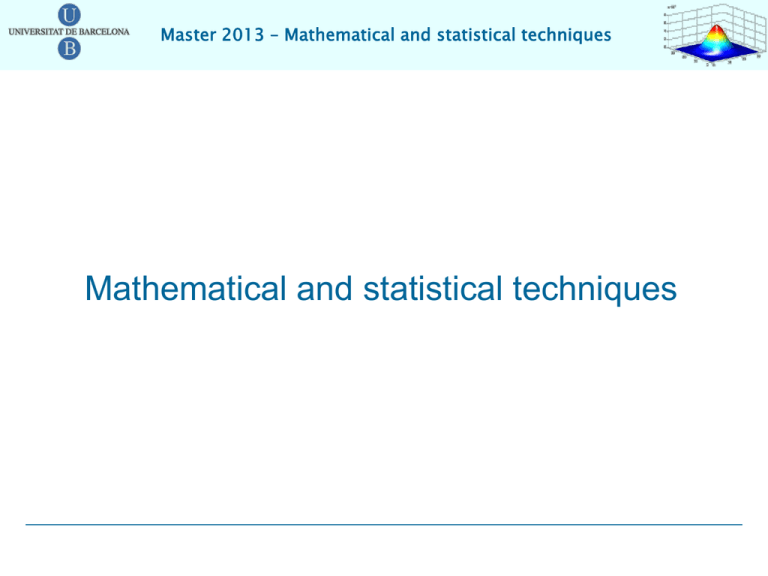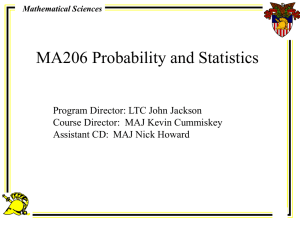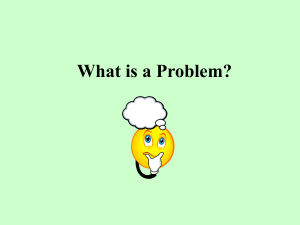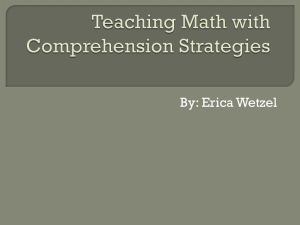Master 2013 – Mathematical and statistical techniques - ICC-UB
advertisement

Master 2013 – Mathematical and statistical techniques Mathematical and statistical techniques Master 2013 – Mathematical and statistical techniques Part I R. Graciani & Hugo Ruiz Master 2013 – Mathematical and statistical techniques 1- Fundamentals of probability theory and statistics General review of probability theory: Random variables and events. Bayes theorem. Probability distributions: binomial, Poisson, Gaussian, Cauchy. Law of large numbers. Hoeffding’s inequality. Central-limit theorem and Berry-Eseen theorem. Statistical inference: Point Estimation Theory, Confidence Intervals, Chi-2 tests, Fisher Information, Cramer-Rao bound, Maximum-likelihood estimators, hypothesis testing, Kolmogorov-Smirnov Tests, Least Squares, Information Theory (Typicality, mutual information, correlations). Hands on work using the R programming language Master 2013 – Mathematical and statistical techniques 2- Monte-Carlo methods • Generalities. Sampling, Integration, Optimisation. • Importance sampling, stratified sampling, rejection sampling. • Metropolis algorithm. Generalities: reversibility, strong ergodicity and convergence. A priori probabilities, parallel tempering, simulated annealing. • Applications of the Metropolis algorithm to statistical Physics, quantum field theory and events generation. Hands on work using the R programming language (TBC) Master 2013 – Mathematical and statistical techniques Part II X. Luri Master 2013 – Mathematical and statistical techniques 3 - Multivariate analysis • Data analysis and representation. Statistical distances. Principal component analysis. • Hierarchical and non-hierarchical clustering. • Discriminant analysis. Hands on work using Weka Master 2013 – Mathematical and statistical techniques 4 - Statistical treatment techniques • Neural networks. • Non-parametric methods of estimation of a probability density function: histograms, simple estimators, kernel estimators. Hands on work using SNSS & the R language Master 2013 – Mathematical and statistical techniques 5 - Databases and data mining • Basic concepts • Introduction to data mining • Case studies Master 2013 – Mathematical and statistical techniques Grading Master 2013 – Mathematical and statistical techniques There will be no exam for this course. Instead, 5 problem assignments will be proposed. The grading will be based on the marks of these assignments. Re-evaluation: the student will have to redo and resubmit the 5 problem assignments correcting them according to the instructions from the teachers. Once they are received they will be evaluated and the student will pass an oral exam on their contents. If this exam is successfully passed the mark of the course will be fixed from the marks of the assignments, otherwise the subject will be graded as non-passed. Master 2013 – Mathematical and statistical techniques Course Material: Campus virtual http://campusvirtual2.ub.edu Master 2013 – Mathematical and statistical techniques Hands-on work tools Basic programming skills are required Master 2013 – Mathematical and statistical techniques The R programming language R is a free software environment for statistical computing and graphics. It compiles and runs on a wide variety of UNIX platforms, Windows and MacOS Master 2013 – Mathematical and statistical techniques “Weka” package Master 2013 – Mathematical and statistical techniques “Stuttgart Neural Network Simulator” package






![Galilei, Galileo (1564 - 1642) [The universe] cannot be read until we](http://s2.studylib.net/store/data/005476024_1-9df318dde86b612540035c06a638f94c-300x300.png)